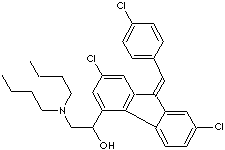|
LUMEFANTRINE |
| Benflumetol; Coartem; DL-Benflumelol; (1R,S)-2-Dibutylamino- 1-{2,7-dichloro- 9-[(Z)(4-chlorobenzylidene)- 9H-fluoren-4-yl}-ethanol; (+-)-2,7-Dichloro-9-((Z)-p-chlorobenzylidene)- alpha ((dibutylamino)methyl) fluorene-4-methanol; (Z)-2,7-Dichloro-9-((4-chlorophenyl)methylene)- alpha((dibutylamino) methyl)- 9H-fluorene-4-methanol; 2-(Dibutylamino)-1-[(9Z)-2,7-dichloro-9-[(4- chlorophenyl) methylidene]fluoren-4-yl]ethanol; |
|
|
| PRODUCT IDENTIFICATION |
|
|
CAS RN |
82186-77-4 |
|
EINECS RN |
|
|
FORMULA |
C30H32Cl3NO |
|
MOLE WEIGHT |
528.94 |
|
|
| PHYSICAL AND CHEMICAL PROPERTIES |
|
|
PHYSICAL STATE |
yellowish crystalline powder |
|
MELTING POINT |
125 - 130 C |
|
BOILING POINT |
|
|
DENSITY |
1.252 |
|
SOLUBILITY IN WATER |
Insoluble (soluble in chloroform and in most organic solvents, slightly soluble in propanol, almost insoluble in ethanol) |
|
pH |
|
|
VAPOR DENSITY |
|
|
REFRACTIVE INDEX |
|
|
FLASH POINT |
|
|
|
| STABILITY AND REACTIVITY | |
| STABILITY | Stable under normal conditions |
|
INCOMPATIBLE MATERIALS |
Strong oxidizing agents. |
| DECOMPOSITION PRODUCTS |
Carbon oxides. nitrogen oxides |
| POLYMERIZATION | Has not been reported |
|
NFPA RATINGS |
Health: 2, Flammability: 0, Reactivity: 0 |
|
|
| SAFETY |
|
|
HAZARD NOTES |
|
|
EYE |
|
|
SKIN |
|
|
INGESTION |
|
|
INHALATION |
|
|
CHRONIC |
|
|
|
| TRANSPORT & REGULATORY INFORMATION |
|
|
UN NO. |
|
| HAZARD CLASS |
|
| PACKING GROUP |
|
| HAZARD SYMBOL |
|
|
RISK PHRASES |
|
|
SAFETY PHRASES |
|
|
|
| EXTERNAL LINKS & GENERAL INFORMATION | |
|
Artemether and lumefantrine combination is a fixed dose artemisinin-based combination therapy (ACT) combining artemether, an artemisinin derivative, and lumefantrine, a synthetic antimalarial drug. Chemical formula of artemether is (3R,5aS,6R,8aS,9R,10S,12R,12aR)-Decahydro- 10-methoxy-3,6,9-trimethyl- 3,12-epoxy-12H-pyrano[4,3-j]-1,2-benzodioxepin whereas chemical formula of lumefantrine is (1R,S)-2-Dibutylamino- 1-{2,7-dichloro- 9-[(Z)(4-chlorobenzylidene)-9H-fluoren-4-yl}-ethanol. Artemether is a sesquiterpene lactone derived from artemisinin. Artemisinin is a compound derived from the sweet wormwood plant and has been used for centuries in traditional Chinese medicine to treat fever. Lumefantrine is a synthetic aryl-amino alcohol antimalarial (quinine, mefloquine and halofantrine are members of the same group). (http://www.malaria-ipca.com/) Of these four latest kinds of antimalarial drugs, two of them, artemisinin derivatives and pyronaridine, were drawn from the Chinese pharmacopoeia. A third Chinese type of drug, lumefantrine, has recently been identified as a promising candidate for use in therapy. Lumefantrine (also called benflumetol, code no. CGP 56695; 1:1 racemate of the dextrogyre and levogyre enantiomers) is a fluorene derivative (2,3-benzindene) that belongs to the aminoalcohol class. The compound was synthesized at the Academy of Military Medical Sciences, Beijing, China, and has undergone preliminary clinical studies in China. Lumefantrine, in combination with artemether (called coartemether), was registered for the oral treatment of malaria in China in 1987. In early clinical studies conducted in China, cure rates of 96% (n = 314 patients) and 92.5% (n = 40 patients) were reported with oral lumefantrine alone (a total dose of 2,000 mg in divided doses over 4 days) and lumefantrine-artemether oral combination (1,920 mg of lumefantrine-320 mg of artemether in divided doses over 3 days), respectively. The clinical efficacy of the lumefantrine-artemether combination has been confirmed recently in China, Thailand, and The Gambia. (http://aac.asm.org/) |
|
|
| SALES SPECIFICATION |
|
|
APPEARANCE |
yellowish crystalline powder |
|
IDENTIFICATION |
pas teat A,B |
|
ASSAY |
99.0% min |
|
LOSS ON DRYING |
0.5% max |
|
RELATED COMPOUNDS |
1.0% max |
|
HEAVY METALS, |
10ppm max |
|
RESIDUE ON IGNITION |
0.1% max |
|
MELTING POINT |
125 - 130 C |
|
|
| PRICE |
|
|
